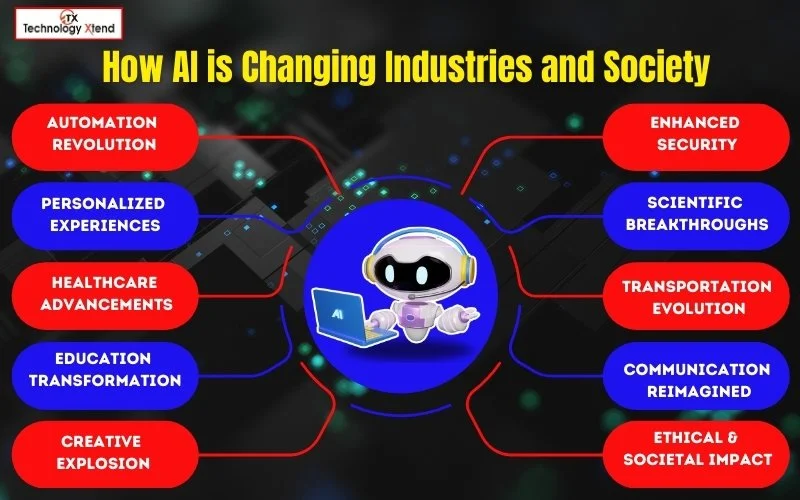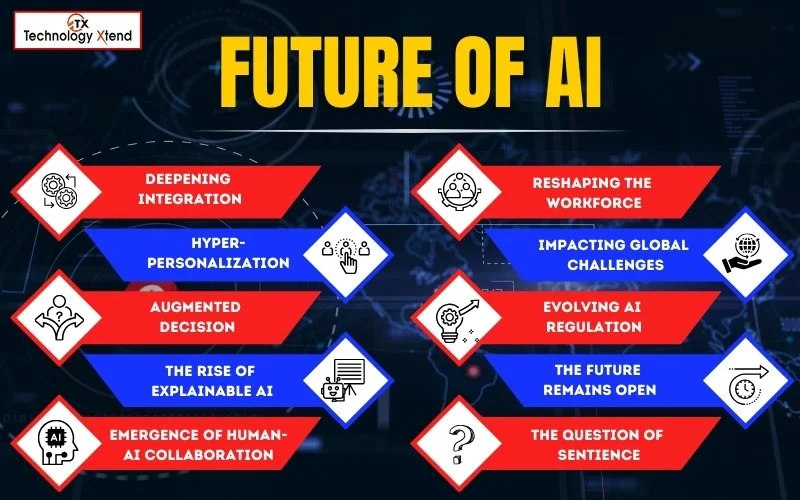
Technology XtendHow AI is Reshaping Industries and Society
From transforming healthcare to revolutionizing finance, discover the mind-blowing ways AI is taking over and changing our world!
Artificial intelligence (AI) has come a long way since its inception in the 1950s. With advances in computing power and data processing capabilities, AI is now poised to revolutionize our society in unprecedented ways. Artificial Intelligence (AI) is no longer just a buzzword; it has become a reality that is transforming the way we live and work. From self-driving cars to personalized medicine, AI is reshaping industries and society in ways we never thought possible. The rise of machines is upon us, and it's about time we take a deep dive into the impact it is having on our world. In this blog post, we will explore how AI is reshaping industries and discuss the ethical considerations surrounding its adoption. We will also delve into the future of AI and its potential impact on our economy and jobs.
"The rise of machines is not about replacing humans, but about augmenting them to achieve greater heights of success and progress. Read more on how AI is reshaping industries and society”
Impact of AI on Various Industries
AI is currently being adopted by various industries, and the impact is already being felt. Here are some examples of how AI is transforming these industries:
Healthcare
In the healthcare industry, AI is being used to improve patient outcomes by enabling precision medicine and enhancing medical imaging. With precision medicine, doctors can tailor treatment plans to individual patients based on their genetic makeup and medical history. Medical imaging, on the other hand, is being improved with AI algorithms that can detect anomalies in radiology images.
Business
AI is also transforming the business landscape by enabling better customer service and fraud detection. Chatbots, powered by AI algorithms, can interact with customers to provide quick and efficient service. Fraud detection is being enhanced with AI algorithms that can identify patterns in financial transactions that may indicate fraudulent behavior.

Education
In education, AI is being used to enhance learning experiences through personalized learning and automated grading. With personalized learning, students receive custom recommendations based on their learning style and progress. Automated grading, on the other hand, allows educators to provide students with instant feedback on their work.
Transportation
The transportation industry is also being transformed with the adoption of self-driving cars and traffic optimization software. Self-driving cars, enabled by AI algorithms, have the potential to reduce accidents and increase traffic flow. Traffic optimization software can also reduce congestion for public transportation by optimizing routes and scheduling.
Also Read - How The AI Is The Future Of Marketing
Ethical Considerations with AI Adoption
The adoption of AI technology also presents ethical considerations that must be considered. Here are some examples of ethical considerations surrounding AI adoption:
Bias in AI Algorithms
AI algorithms are only as good as the data they are trained on. If the data sets used to train an AI algorithm are biased, the algorithm itself will be biased as well. This can perpetuate existing biases in society, such as racial or gender biases. To mitigate these biases, it is critical to ensure that AI algorithms are trained on diverse and representative data sets.
Privacy Concerns
AI algorithms rely on large amounts of data to function, which can raise privacy concerns. Companies must ensure that they are using data responsibly and transparently. Additionally, individuals must be informed of how their data is being used and have the ability to control their data.
Accountability and Responsibility
As AI technology becomes more prevalent, questions of accountability and responsibility arise. For example, if a self-driving car causes an accident, who is responsible? These questions must be addressed to ensure that AI is used in a safe and responsible manner.
Future of AI
The future of AI holds tremendous potential. Here are some predictions for the future of AI:
Near Future (5-10 years):
- Deepening integration into daily life: AI assistants will become even more sophisticated, managing schedules, homes, and personal finances. Healthcare will see wider adoption of AI for diagnostics, personalized medicine, and drug discovery. Transportation will be increasingly automated with self-driving cars and drones.
- Focus on explainability and fairness: As AI becomes more complex, understanding its decision-making processes will be crucial to build trust and address biases.
- Rise of specialized AI: We will see more specialized AI solutions tailored to specific industries and tasks, like AI-powered lawyers or financial analysts.

Mid-Term Future (10-20 years):
- Significant impact on the workforce: Automation will likely displace some jobs, but also create new ones requiring collaboration between humans and AI. Reskilling and upskilling will be essential.
- Advancements in artificial general intelligence (AGI): AGI, where AI machines can understand and reason like humans, remains a distant possibility but could revolutionize various fields.
- Ethical considerations become paramount: Issues like data privacy, security, and potential misuse of AI will require careful consideration and regulations.
Long-Term Future (20+ years):
- Blurring lines between humans and machines: Advanced brain-computer interfaces and prosthetics could potentially merge human and artificial intelligence.
- AI tackling global challenges: Climate change mitigation, resource management, and sustainable development could benefit greatly from advanced AI solutions.
- Unforeseen possibilities: As AI progresses rapidly, predicting the long-term future becomes increasingly difficult. New discoveries and breakthroughs could lead to unimaginable scenarios.
It is important to remember that the future of AI is not predetermined. The path it takes will depend on choices we make today regarding development, implementation, and regulation.
Conclusion
Related Articles









































